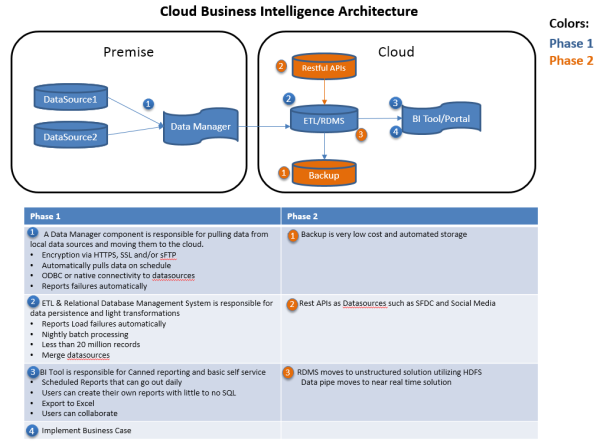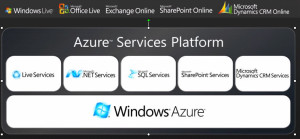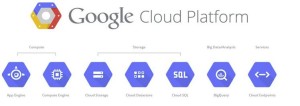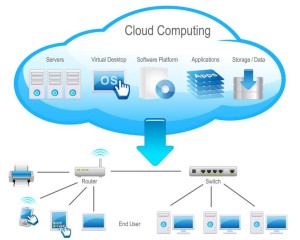
As an IT provider, I am overwhelmed with all the options for Business Intelligence in the cloud and very confused by how to compare service offerings in order to effective provide the best solutions. In the article we will discuss some of the different offerings on the market and why all business are racing toward the cloud for Business Intelligence Solutions. I like to think of BI in generally two layers the visualization tools and the back end process tools. So let’s start there for WHY BI in the Cloud makes sense.
Presentation and Data Visualization
Data visualization in the cloud offers an intelligent solution for businesses to access data with better convenience and enhanced productivity. Business Intelligence (BI) cloud computing offers a more plug and play method to try new tools sets with an ease of implementation for a stand-up perspective. The tools are evolving quickly and as a solution you may want to not get tied to closely to a single solution. Also, many of the new tools are tailored to specific verticals. Among these pioneers in turning cloud computing as a powerful source of business intelligence are Amazon, Google and Microsoft. Using BI cloud computing technology, these companies successfully demonstrated that the cloud (internet) has a strong capability of storing data without the use of costly hardware and other physical computing devices.
Costly data servers replaced by cloud servers
Using physical computing devices and hardware for data storage is costly. A traditional data center is mostly made up of software, hardware, power supplies and networks with disaster recovery systems. A growing digital marketing business can build big data every day and over time this entails bigger costs for a business enterprise. Overhead expenses can take up 58% of the revenues of businesses to pay for labor costs, taxes and air conditioning while the 42% of the expenses are thrown out for hardware and data recovery systems and maintenance.
The advent of cloud data center offers businesses a more cost effective solution for data management and storage. In contrast to the traditional data center, running data on the cloud is built on a different scale that is more economically viable for running it as both a data center and business intelligence network. The labor costs for running a BI cloud computing center is reduced to 6 percent and the power distribution or cooling is also down by 20 percent as compared to the traditional data center. It also saves the costs for needing a bigger space to keep hardware and data storage devices. Moreover, cloud computing enhances the efficiency and workflow of an organization because the data is accessible in the cloud.
The leading BI Cloud Computing Providers
There are three giant companies that are known to build their own BI cloud computing infrastructures that help reduce the costs in using business intelligence tools running in the cloud. Amazon Web Services (AWS) Cloud, Microsoft Azure and the Google Cloud Platform are the leaders in delivering the future of business intelligence infrastructure for digital marketing using the cloud computing technology. Their virtual cloud center machines offer marketers a more cost effective solution for business intelligence for data storage and analytics. We dissect through each of the product cost comparisons and their business intelligence solutions and features to help you capture the most innovative BI cloud computing services in the market today. We suggest to directly communicate with these providers to get an accurate quote for their pricing, though.
The Amazon Web Services (AWS) Cloud
What Is the AWS Cloud?
AWS Cloud services deliver comprehensive applications that can be used for business intelligence. Amazon Web Services consist of various apps for analytics, data applications, data storage and database, global compute and cloud infrastructure to help small to big enterprises grow their data computing center wider at a lower IT costs. Among the most sought after data applications on the cloud from Amazon Web Services are data processing, data warehousing, data storage, archiving and applications on mobile and web platforms. These services for cloud computing help to revolutionize businesses, giving them more control on scaling up and down their business intelligence needs. Its most popular BI cloud computing infrastructures are the Amazon Redshift and Amazon S3.
- Amazon RedShift for data analytics and cloud database
One of the cloud applications from AWS is the Amazon Redshift which is known for its robust features for data analytics and data storage. It provides a petabyte-scale warehouse for data storage in the cloud. The user can exercise a quick data analytics and evaluate performance to scale your data and work more efficiently together with your current business intelligence tools. It stores data across multiple nodes and provides a fast and accurate data report. The product runs on an SQL platform and is built to be integrated with the other Amazon Web Services like the Amazon S3, Amazon Elastic Map, Amazon DynamoDB and Amazon Kinesis as among many others. Most of the administrative tasks run on an automated platform and provisioning.
- Amazon S3 cloud storage
This is Amazon’s simple, storage, service (S3) cloud storage infrastructure that allows the user to store and access data from the cloud anytime. Its main feature is to deliver a simple cloud-based data storage system that is highly scalable for more convenient data computing process. It has a simple interface that allows businesses secure, scale, store, and manage data in the cloud environment. Users can archive and backup critical data use for their business intelligence platforms. The Amazon S3 provides businesses a viable solution for easy and quick data storage and content distribution using its Reduced Redundancy Storage (RRS) system. Your in-house data can become accessible to your customers or employees by sharing selected data to them through the RRS system. It delivers an efficient cloud computing business intelligence solution for that promotes business efficiency.
AWS BI Cloud Computing Costs
The costs for each Amazon Web Service and cloud computing tools vary accordingly. Here are the comparative costs of its two popular cloud computing platforms to help you determine which offers the most cost effective cloud computing solution that works best for your business intelligence tool and data management needs.
- Amazon Redshift Costs
This product costs on a pay-as-you-go system. The user is charged on an hourly basis, giving better flexibility in managing your budget. It is highly cost effective as it runs faster in analyzing data, giving the user more data analytics to work on, even with different business intelligence tool. You can start small at $0.25/hour without the need to pay for upfront fees. For more cost effective use of the Amazon Redshift as you begin to grow a bigger data warehouse, you can enjoy its $1,000 per terabyte annual fee.
The pricing for Amazon Redshift as you begin to set-up your cloud computing systematically for data storage and analytics will typically depend upon your data warehousing needs. If your data warehouse consists of more than 500 GB, Redshift offers its Dense Compute nodes payment cluster at $5,500 per terabyte a year. For smaller data storage need of less than 500 GB, the $1,000 per terabyte per year rate or lesser is also available. Subscribers can opt for a per hour rating or subscribe for a three-year term for better discounts.
- Amazon S3 Costs
The user only pays according to their usage. The platform does not impose any minimum fee. Its subscribers can avail of the Amazon S3 free usage tier upon sign-up. The privilege allows the users to use 5GB of its standard storage with 20,000 Get Requests feature and a free 15GB data transfer every month for a year. Because the Amazon AWS pricing is highly flexible, you can choose from its lower standard storage of $0.0300 per GB. Its reduced redundancy storage fee begins at $0.0240 per GB while its Glacier storage fee begins at $0.0100 per GB. The pricing gets higher as your data storage needs increase. The users may be charged separately for data transfer in and out of the Amazon S3 warehouse that may cost about $0.000 per GB.
AWS Benefits and Features
The Amazon cloud computing services have a distinct computing landscape as compared to the traditional data centers. Being a BI cloud computing vendor, it offers distinguishable features that benefit its users. These features include:
- Flexibility
Its flexibility feature provides the users less difficulty in using their current business intelligence tools. The Amazon cloud computing services run on various platforms, operating systems, databases and IT architectures, making it highly convenient in matching an organization’s current data computing needs.
- Scalable platform
The user can easily scale their usage high or low to meet their customer demands and an organization’s needs. The Amazon Cloud Services provides a useful resource ideal for short-term data storage and testing critical data analysis, as well as performing data analytics at regular intervals.
- Cost efficient
Amazon only charges the user of their BI cloud computing technology, according to their actual usage of the service without the additional upfront charges. The user is not restricted according to their bandwidth and data storage needs. The service does not impose a minimum fee nor require the users to sign up for longer commitment.
- Security
The Amazon Web Services run its cloud computing infrastructures through the highest safety standards with high regard on the user’s privacy and security needs. It meets various certification standards and accreditation in order to deliver a top notch security feature for all its cloud computing and services tools. Amazon has its own secured and controlled data centers across the globe that maintains its physical data center security. Its data privacy feature consists of personal and business data encryption on the cloud with a backup feature to keep your customer data secured.
The Microsoft Azure Cloud Platform

What is Microsoft Azure?
The Microsoft Azure is the cloud-based platform that provides integrated cloud services like data storage, cloud computing, networking and various cloud applications running on Microsoft Cloud Data Center. The Azure is hosted by an internet-based operating system of Microsoft where you can build various cloud applications that can be integrated with your business intelligence tools. It has an open architecture where the users have the leeway of developing their own BI apps connecting to their own servers, computers or other on-premises BI tools and devices.
The Microsoft Azure helps businesses simplify their cloud computing needs using an automated platform that comes with a highly dynamic scaling capability. Users with the skill in manipulating apps in the Microsoft Visual Studio and Microsoft .NET framework can easily run their apps in the cloud. This cloud-based platform provides a pay-as-you-go cloud services and pricing models. The platform is open and supported by various internet protocols like XML, REST, HTTP and SOAP.
The Microsoft Azure Infrastructure-as-a-Service (IaaS) and Platform-as-a-service (PaaS) are considered to be one of the industry leaders today in cloud computing services. Users can easily deploy business intelligence tools and applications for more efficiency and productivity. The Microsoft hybrid of cloud services eliminates the division of your IT infrastructure. Using the program will allow you to economically run and efficiently use your BI tools and applications on both your on-premise and in the cloud environment without the complexities involved. You can easily store data, backup your data and apps and maintain a stable and reliable recovery system.
The Microsoft Azure Costs
Using the Microsoft Azure cloud platform provides a flexible pricing for its services. Subscribers will not be charged with an upfront fee or a termination fee. You have better flexibility in your usage as you will only be billed per minute of using the system. For business startups, you can start subscribing for the cheapest cloud service pricing that starts at $0.02/hr with a disk size of 19 GB. This fee may yield to cost you approximately $0.64/hr for a disk size of 2,039 GB. This is ideal for general usage of web applications and for small to medium databases. Azure also provides flexible plans for more intensive cloud computing activities for businesses that need to use larger memory for their database. The price range is between $0.35/hr to $1.41/hr of 489 GB and 2,039 GB respectively. Compute intensive users will need a higher range of direct memory access, high cluster performance, simulations, video encoding and other similar intensive cloud computing activities. Businesses may be charged between $2.45/hr and $4.90/hr for 1,777 GB disk space for as much as 112 GB RAM. Please see the Azure pricing calculator http://azure.microsoft.com/en-us/pricing/calculator/
The Microsoft Azure Advantage Features
The Azure delivers built-in software patching, low-level scalable storage, networking and data computing. The platform serves wide latitude of cloud-based implementation using the .NET framework concepts for access and workflow control. Users can easily synchronize photos, videos, files and documents to their mobiles, PCs, and web applications. Business intelligence tools and contents collaborate easily on the cloud using the Microsoft SharePoint Services and Microsoft Dynamics CRM services. Other advantaged features of Microsoft Azure are the following:
- Applications and infrastructure provisioning
The hybrid Microsoft Azure consistently enables the user for provisioning Windows and Virtual Machines from Linux to your on-premises BI applications.
- Build a modern business intelligence apps
Microsoft Azure provides a platform for deployment of a wide range of applications for media, mobile and web solutions. It comes with a built-in AutoScale dynamic platform for scaling data management and usage and for creating your own business intelligence data and applications in the cloud.
- Data management
Businesses can obtain insights for data using SQL and NoSQL data services. It comes with documentation, data storage and built-in support for gainful acquisition of data solutions. The SQL server in the cloud allows you to build Hadoop clusters for data analysis and HD Insight. Enjoy high flexibility and scalability of data for businesses with affordable data management process.
- Access and identification management
All business cloud applications are accessible through the Windows Azure Active Directory that is loaded with identity and access management features for data management. Synchronize your on-premise directoryes and access them through a single account on Azure, Microsoft Office 365 and other applications on SaaS like Concur, Workday, DropBox, Google Apps, DocuSign and Google Apps.
The Google Cloud Platform

What is Google Cloud Platform?
The Google Cloud Platform provides developers the ability to deploy and test modern business intelligence tools and applications using the highly scalable Google Cloud infrastructure. The platform provides a computing and cloud storage application services that work best for mobile, web and backend solution. The Google Cloud Platform provides the users various building blocks for data storage solution using its Cloud Storage, Cloud Datastore and Cloud SQL. If a business is developing various complex BI apps that best fit their cloud computing needs, the Google Cloud Platform provides an ideal workspace.
The Google Cloud Storage
Google has the object storage space where accessible API and advanced features can be used for BI apps. There are different programming languages available to help you work on your BI apps efficiently. The platform comes with CRC-based integrity for creating more robust applications for business intelligence. The storage makes static objects accessible using the BigQuery, Google cloud platform and App Engines with speed, OAuth security and flexibility. The Cloud Datastore also provides a schema-free database to keep your non-relational data. It scales up transactions automatically and provides SQL-like queries. Google Cloud manages the data replication and manages data on its MySQL database in the cloud for better data availability and app performances.
Google Big Data Query
Big data analytics become more convenient using the BigQuery platform in the cloud. It performs like lightning for quick queries on multi-terabyte datasets in just a few seconds. It is highly scalable and convenient to use in obtaining real time data insights for data analysis. You can execute data queries without interference to the other data applications running in the background. Data importation is quick and the app can stream a burst of 100,000 rows of data in every second. The app is highly useful and convenient for high volume data analytics and transactions.
The Google Cloud Platform costs
The Google Cloud Storage offers a flat rate pricing for storage and based on a usage rate per network. The bandwidth usage is calculated in GB which is equivalent to 230 bytes. The standard storage rate is $0.026 for every GB per month. Google approximates the general average for the costs in using at least 50GB for standard data storage for a month for small start-up businesses. At $0.026 rate GB, it will cost you around $1.30 a month for using the Google data storage services. The more data you use for business, the rate increases, but it gives you a cheaper rate for data storage costs as you will only be paying per the actual GB you used. Use the Google price calculator available on their website in order to obtain a more accurate pricing according to your data storage needs.
Google Cloud SQL offers two plans for app development. For more lightweight BI apps users, the flexible per usage pricing scheme provides a more costs effective means of accessing your data in the cloud. This will cost you around $0.36 a day for 0.5GB storage, use up to $46.84 a day of 10GB storage at 16 GB RAM. For additional storage, Google charges $0.24GB per month up to 100GB. For those with higher data traffic, the package costs more.
The best thing about the Google BigQuery service is that you will be charged only based on data processed for each column result of your queries, not based on the entire columnar data table. The loading and exporting of data service is free. For every batch query and interactive query, users are charged at $5 per TB that is processed.
The Google Cloud Computing Platform Benefits and features
Among the best features of the Google Cloud Computing Service that makes it one of the most preferred cloud computing services used for business intelligence are the following:
- Cost effective billing for per minute-level increments of cloud usage, saving the user from paying for unused computing times. Discounted pricing is also available for long running workloads without causing you long term commitments.
- Quick provisioning for deploying clusters of data using Google’s intuitive computing tools. This includes command interface, Restful API and console manager in the cloud.
- Unmatched data security for data encryption. Data is written in Compute Engine that comes with the highest compliance in 27001, SOC 1-3 certifications and SSAE-16 data security systems.
- Run your large scale workloads in the cloud on its robust Google cloud infrastructure.
- Larger compute clusters is easily created using the platform’s cross-machine bandwidth that allows the user to connect various cloud computing services to a company’s private business intelligence apps and on-premise network.
Digital Warriors provides services like IT consulting, marketing analytics, social media marketing, search engine optimization and web design and development to help you grow your digital marketing campaigns in the era of big data.

